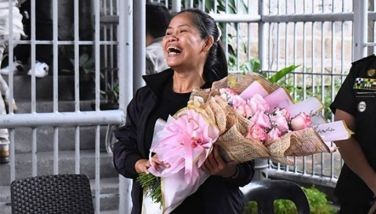Nabbed Bali suspect linked to RP groups
November 13, 2002 | 12:00am
Police and military authorities said yesterday that a principal suspect in the Oct. 12 powerful bomb blast in Bali, Indonesia maintained close ties with Islamic terrorists in the Philippines.
The suspect, identified only as Amrozi, was arrested by the Indonesian police in his residence in Manado area last Nov. 7.
"With information from our counterparts in Indonesia, we were able to trace and establish Amrozi’s links with the Islamic terrorist groups operating in the country (Philippines) through his and his brother Muklas’ close association with Riduan Isammudin, also known as Hambali," the sources said.
Indonesian authorities theorized that Amrozi, who has reportedly admitted planting the bomb that tore through two nightspots in Bali popular among foreign tourists, was on his way to Mindanao when he was nabbed as indicated by two passenger tickets found in his house.
The blast, believed to be the handiwork of militant Islamists in Indonesia belonging to the Jemaah Islamiyah (JI), left close to 200 people dead, many of them foreigners, and injured scores of others.
The JI is believed to be a Southeast Asian cell of the al-Qaeda network of Osama bin Laden.
Apart from Muklas, the Indonesian police were also tracking down two other brothers of Amrozi, identified as Ali Imran and Gufron, believed to be members of JI’s Mantiqi 3 (M3) which established two training camps in Camp Abubakar, main headquarters of the Muslim secessionist rebel group, Moro Islamic Liberation Front (MILF) in Maguindanao province in Mindanao.
The sources in the intelligence community said Muklas was head of Mantiqi 1 (M1), taking over the 36-year-old Hambali, al-Qaeda point man in Southeast Asia, who was unseated after his group failed to carry out bomb attacks on the US and Israeli embassies in Manila sometime in 2000.
Hambali was tagged as a JI financier who allegedly bankrolled the so-called Rizal Day bombing spree in Metro Manila two years ago, killing at least 18 people and wounding several others.
Fathur Roman al-Ghozi, principal suspect in the Dec. 30, 2000 bomb attacks, has been arrested and convicted by a trial court in General Santos City.
The Philippine, Malaysian and Singaporean police pointed to Hambali as a prominent figure in the Southeast Asian cell of the al-Qaeda. –Jaime Laude, Christina Mendez
The suspect, identified only as Amrozi, was arrested by the Indonesian police in his residence in Manado area last Nov. 7.
"With information from our counterparts in Indonesia, we were able to trace and establish Amrozi’s links with the Islamic terrorist groups operating in the country (Philippines) through his and his brother Muklas’ close association with Riduan Isammudin, also known as Hambali," the sources said.
Indonesian authorities theorized that Amrozi, who has reportedly admitted planting the bomb that tore through two nightspots in Bali popular among foreign tourists, was on his way to Mindanao when he was nabbed as indicated by two passenger tickets found in his house.
The blast, believed to be the handiwork of militant Islamists in Indonesia belonging to the Jemaah Islamiyah (JI), left close to 200 people dead, many of them foreigners, and injured scores of others.
The JI is believed to be a Southeast Asian cell of the al-Qaeda network of Osama bin Laden.
Apart from Muklas, the Indonesian police were also tracking down two other brothers of Amrozi, identified as Ali Imran and Gufron, believed to be members of JI’s Mantiqi 3 (M3) which established two training camps in Camp Abubakar, main headquarters of the Muslim secessionist rebel group, Moro Islamic Liberation Front (MILF) in Maguindanao province in Mindanao.
The sources in the intelligence community said Muklas was head of Mantiqi 1 (M1), taking over the 36-year-old Hambali, al-Qaeda point man in Southeast Asia, who was unseated after his group failed to carry out bomb attacks on the US and Israeli embassies in Manila sometime in 2000.
Hambali was tagged as a JI financier who allegedly bankrolled the so-called Rizal Day bombing spree in Metro Manila two years ago, killing at least 18 people and wounding several others.
Fathur Roman al-Ghozi, principal suspect in the Dec. 30, 2000 bomb attacks, has been arrested and convicted by a trial court in General Santos City.
The Philippine, Malaysian and Singaporean police pointed to Hambali as a prominent figure in the Southeast Asian cell of the al-Qaeda. –Jaime Laude, Christina Mendez
BrandSpace Articles
<
>
- Latest
- Trending
Trending
Latest





























